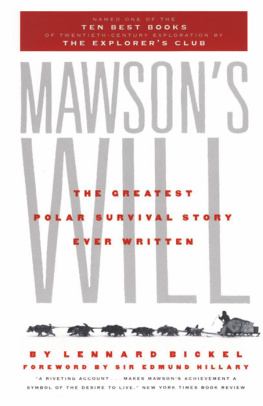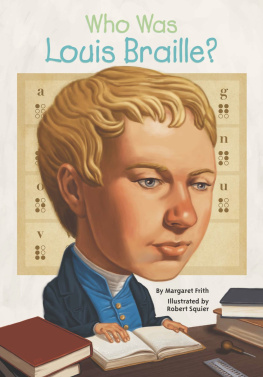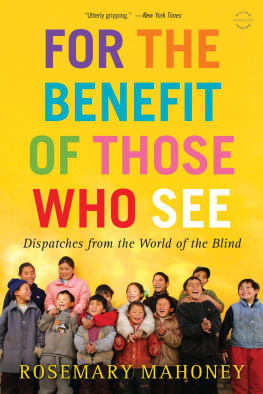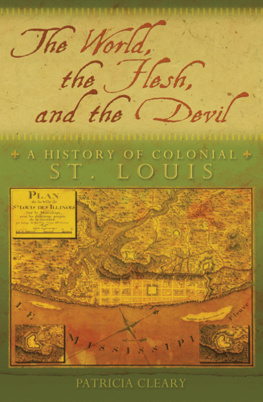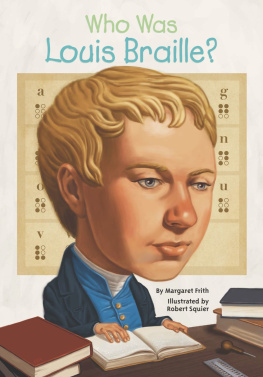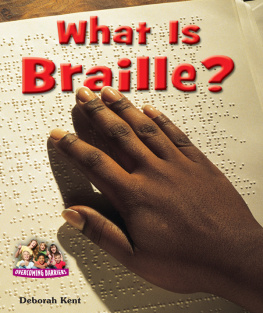TRIUMPH OVER DARKNESS
THE LIFE OF LOUIS BRAILLE
LENNARD BICKEL

For
Jan Smark Nilsson
For copyright reasons, any images not belonging to the original author have been removed from this book. The text has not been changed, and may still contain references to missing images
This electronic edition published in 2015 by Bloomsbury Reader
Bloomsbury Reader is a division of Bloomsbury Publishing Plc, 50 Bedford Square,
London WC1B 3DP
First published in Great Britain in 1988 by Susan Haynes Book
Copyright 1988 Lennard Bickel
All rights reserved You may not copy, distribute, transmit, reproduce or otherwise make available this publication (or any part of it) in any form, or by any means (including without limitation electronic, digital, optical, mechanical, photocopying, printing, recording or otherwise), without the prior written permission of the publisher. Any person who does any unauthorised act in relation to this publication may be liable to criminal prosecution and civil claims for damages.
The moral right of the author is asserted.
eISBN : 9781448214853
Visit www.bloomsburyreader.com to find out more about our authors and their books. You will find extracts, author interviews, author events and you can sign up for newsletters to be the first to hear about our latest releases and special offers.
You can also find us on Twitter @bloomsreader.
Contents
It is high time for Louis Brailles genius to be recognised throughout the earth and for the story to be told of the godlike courage and the heart of gold with which he built a large, firm stairway for millions of sense-crippled human beings to climb, from hopeless darkness to the Mind Eternal.
Were it not for Louis Braille, the world of the blind would be quite drab, worse than it would be for the seeing without ink-print books. Out of personal experience I give deepest thanks to Louis Braille, who dropped upon the Sahara of blindness his gift of inexhaustible fertility and joy. I studied at Radcliffe College (USA) with the aid of European Braille books, not only in English, but also in French, German and Greek. The world around me shone afresh with treasures of poetry, and thought on philosophy, history and literature in other lands. Enraptured, I sensed my membership of the human race anew.
Louis Braille died a complete human being, though blind; great because he greatly used his loss of sight to liberate his afflicted fellow creatures. The unwearied activity of his clear, scientific mind, his calmness and forbearance, his inventive abilities as a teacher, the wealth of his heart expended in uncounted secret gifts out of scant savings to the needyboth blind and seeingare a priceless legacy.
Helen Keller1952
(On the centenary of the death of Louis Braille.
By courtesy of the
Royal National Institute for the Blind, London)
Access to communication in the widest sense is access to knowledge, and that is vitally important for us if we are not to go on being despised or patronised by condescending sighted people. We do not need pity, nor do we need to be reminded that we are vulnerable. We must be treated as equalsand communication is the way we can bring this about.
Louis Braille
1841
The decades of bloodshed that stained the end of the eighteenth century in France made the capital, Paris, an unlikely birthplace for historic advance in the human condition. Then a tawdry, crowded city, and the most populous in Europe, Paris daily witnessed poverty, misery, cold and hunger on a shocking scale. Suffering was taken as a mode of life and met with an indifference that was as cruel as the imperial dictatorship that would follow.
It was still the seatby divine rightof the Bourbons, supreme rulers of the ancien rgime, who seemed destined never to learn, never to scent the wind of change, unable to see doom breeding in the squalid streets and alleyways of crowded tenements not a stones throw from the back doors of their splendid residences and palaces. In blissful oblivion they were uncaring of suffering and of the simmering anger, rising to hatred, that would soon convulse both city and nation in the blood-lust of vengeful revolution. Apathy, heartless lack of concern and indifference to affliction were national traits at this time. Life was cheap to princes of the blood and la noblesse, as cheap as it would be to the ghouls of the Reign of Terror and to the ambitious First Consul, who would later crown himself Emperor and be seen riding the corpse-littered battlefield of Borodino bouncing with glee in the saddle when counting five dead Russians for every slain Frenchman.
In the eighth decade of the century the gulf between privileged possession and the poor and handicapped was ominously wide. Parisso different to the modern metropoliswas hemmed about with medieval fortifications, such as the old Bastille, studded with palaces and gothic churches and splendid abbeys, while solid mansions lined the famous boulevards, the faubourgs of St-Honor, St-Marceau, St-Jacques and St-Germain, fringed by the green belts of the Champs-Elyses and Champ de Mars, still then open country.
Caught within all this, behind the facades of ornate homes occupied by elegant gentlefolk, some 600,000 people huddled into hovels sandwiched in rabbit warrens of tangled streets and narrow winding alleyways. This multitude of hungry, impoverished people existed among squalor and filth, where night-pots and wastes were emptied into the gutters, where the only light that shone came from the sky, where the only water used came from some public fountain or the bank of the polluted river; where, consequently, disease was rampant among young and old alike. And in those years, so critical to European and world history, nature added its barbs to the suffering. Winters were so savage the river froze, and there were shortages, not only of food, but also of fuel for heating; while summers seemed to come with fierce apology, the sun baking the land into submission and ruining harvests that might have brought relief.
And still the royal circus continued on its frivolous path, with no other government for the nation; the nobility and wealthy landholders maintained their graceful way of life, blithely indifferent to the rage that would end their privilege in a tide of blood, with pillaging of fine homes, desecration of churches and the murder of priests and raping of nuns.
Such was the backdrop in early autumn of 1771, when a young Frenchman met with an experience that moved him so deeply that he was committed to a mission that, eventually, would reach out to touch the lives of millions yet to be born. In that year, after the heat of summer had lifted from Paris, the fashionable life of the city was returning to activity; the well-to-do came back from summer retreats to their ornate mansions, fine carriages drawn by teams of high-stepping percherons were again rolling along the boulevardsand the Sunday parades were resumed. The paths of favourite parks, such as Ruggieris or the more sedate Tuileries (which had been created for Catherine of Medici two centuries earlier), were scenes of colour, where women in full skirts, dainty frilled blouses and wide bonnets strolled with gentlemen, dandies in bright high-collared coats, ribboned perukes under tricorne hats, white hose and buckled shoes and slim rapiers swinging from silvered belts, all of them nodding and smiling faintly at passing acquaintances.
This was formality, families strolling together, to be seen by others in their finest clothes, to be seen to be well-to-do. For younger men there were other attractions on an autumn Sunday. There were the traditional fairs of Paris, noisy, brash, challenging gatherings that competed with the sedate parades. And on this second Sunday in September 1771, there was the Foire St-Ovide, within sight and sound of the sedate processions in the Tuileries, close enough to attract a serious young man in his mid-twenties from an ambling group.


